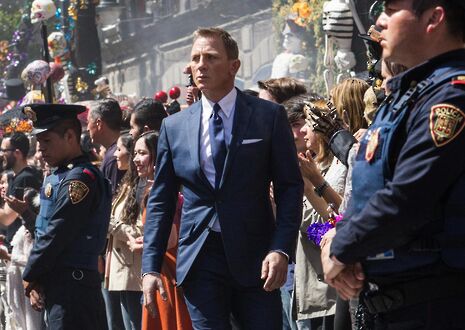VisCourse: The Bond Complex
Josh Kimblin considers the cult of James Bond and wonders what continues to draw audiences, half a century after 007’s debut

James Bond is a unique phenomenon. In an age of sequels and remakes, Bond remains the original cinematic franchise, with 24 films stretching over 55 years. No other series, save perhaps Star Wars, has had such an impact on popular culture or matched Bond’s longevity. Bond’s book-based rivals, like Bourne, Harry Potter and The Lord of the Rings, remain limited by their literary canons. The other staples of the spy/action genre, such as Mission Impossible and Die Hard, are hampered by franchise fatigue and ageing leads. By comparison, Bond is seemingly eternal.
This begs a question, however. By all contemporary standards, the series ought to be a tired formula. Bond is widely recognised (even by Daniel Craig) as a violent, alcoholic, psychologically disturbed misogynist. The supporting leads are often cardboard cut-outs. The stereotypical villains and objectified women run counter to the current cultural zeitgeist. So why do we keep watching?
The common explanations are as numerous as they are unsatisfying. Is Bond a last hurrah for lost imperial influence? Unlikely. The idea of a single man saving the world has been gradually amended over time, due to its increasing implausibility. Besides, the more recent films have shifted their attention from Cold War interventions to the threats of multi-national corporations, leaving world domination as the preserve of spy spoofs.
“The stereotypical villains and objectified women run counter to the current cultural zeitgeist. So why do we keep watching?”
Is Bond the last cultural refuge of a lost and toxic masculinity? Perhaps. Most men have fantasised about becoming a super-spy, but nobody wants to admit it once their age reaches double figures. That said, Bond’s occasionally camp manner jars with his supposedly macho image.
Forget post-imperial longings and quasi-Freudian explanations, though: James Bond’s permanence is the product of a cinematic cult. James Bond is, perhaps, a religion in film.
The Bond phenomenon makes perfect sense in religious terms. The plots are ritualistic and endlessly repeatable: the basic patterns of threat and resolution, transgression and redemption have gone unchanged since 1962. The action sequences are also formulaic. The rites of the car chase, the gun fight, the martini order and the sex scene unfold with all the familiarity of a religious service. Bond himself produces miracles of survival – doctors have pointed out the opening sequence of Skyfall would have killed any mortal man. Above all, he is routinely reincarnated in a younger self. No wonder men worship him!
To continue along the same theme, the series has had its heresies and travesties. The modern evil of product placement is particularly grating – I’ll never forgive Casino Royale for giving Craig a Ford Mondeo and a Sony Ericsson. Bond has also undergone regular reformations, as the tonal needle fluctuates between the silly and the serious. Moonraker’s laser-gun shootout in space was followed by the gritty realism of For Your Eyes Only. The absurdity of the late Moore era was corrected with Dalton’s all-too-brief stint. Most recently, the painful memories of Die Another Day were banished by Craig’s return to hard-core parkour ’n’ punching.
“The Bond phenomenon makes perfect sense in religious terms. The plots are ritualistic and endlessly repeatable: the basic patterns of threat and resolution, transgression and redemption have gone unchanged since 1962”
Of course, the critics will cry that the religious metaphor could be applied to any successful series with a legion of fans. By way of proof, over 175,000 people identified as Jedi knights in the 2011 census. However, James Bond holds a cultural relevance which Star Wars does not: as a mirror for contemporary society’s tastes, fears, and prejudices.
Bond girls are always dressed in the day’s fashion; the bad guys are social stereotypes. Watch closely and you’ll notice how many henchmen are either black or Eastern European. So much for polite British political correctness!
In fact, you can write a history of 20th century Western paranoia by looking at the identities and ingenious plans of Bond’s enemies. His arch-nemesis Blofeld conformed to the ‘megalomaniac German’ trope, designed to arouse all the worst fears of the post-war British imagination. The plots from the height of the Cold War regularly involved hijacking weapons of mass destruction or the threat of nuclear armageddon. Indeed, in one of the most curiously dated examples, Timothy Dalton’s 1987 Bond helped the (noble) Afghan mujahideen fight against their (corrupt) Soviet invaders. The Brosnan era looked uneasily at China and North Korea, while Craig has dealt with unstable African states, mass surveillance, and computer hacking.
A Bond film is always a mirror of its time; just as past instalments have negotiated the politics of sex and gender, so future films will have to deal with Bond’s identity differently. The suggestion that Idris Elba might follow Craig, for instance, raised the issue of race. This is perhaps where Bond seems most like a religious cult: its audience has an undying faith. An individual film might fail but the series will carry on regardless. Long may it continue
 Comment / Anti-trans societies won’t make women safer14 November 2025
Comment / Anti-trans societies won’t make women safer14 November 2025 News / Controversial women’s society receives over £13,000 in donations14 November 2025
News / Controversial women’s society receives over £13,000 in donations14 November 2025 News / John’s rakes in £110k in movie moolah14 November 2025
News / John’s rakes in £110k in movie moolah14 November 2025 Fashion / You smell really boring 13 November 2025
Fashion / You smell really boring 13 November 2025 Music / Three underated evensongs you need to visit14 November 2025
Music / Three underated evensongs you need to visit14 November 2025









